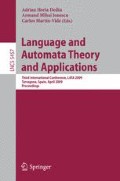Abstract
In 1995 M. Schellekens introduced the theory of complexity spaces as a part of the development of a mathematical (topological) foundation for the complexity analysis of programs and algorithms [Electronic Notes in Theoret. Comput. Sci. 1 (1995), 211-232]. This theory is based on the structure of quasi-metric spaces which allow to measure relative progress made in lowering the complexity when a program is replaced by another one. In his paper, Schellekens showed the applicability of the theory of complexity spaces to the analysis of Divide & Conquer algorithms. Later on, S. Romaguera and Schellekens introduced the so-called dual (quasi-metric) complexity space in order to obtain a more robust mathematical structure for the complexity analysis of programs and algorithms [Topology Appl. 98 (1999), 311-322]. They studied some properties of the original complexity space, which are interesting from a computational point of view, via the analysis of the dual ones and they also gave an application of the dual approach to the complexity analysis of Divide and Conquer algorithms. Most recently, Romaguera and Schellekens introduced and studied a general complexity framework which unifies the original complexity space and the dual one under the same formalism [Quaestiones Mathematicae 23 (2000), 359-374]. Motivated by the former work we present an extension of the generalized complexity spaces of Romaguera and Schellekens and we show, by means of the so-called domain of words, that the new complexity approach is suitable to provide quantitative computational models in Theoretical Computer Science. In particular our new complexity framework is shown to be an appropriate tool to model the meaning of while-loops in formal analysis of high-level programming languages.
Access this chapter
Tax calculation will be finalised at checkout
Purchases are for personal use only
Preview
Unable to display preview. Download preview PDF.
References
Abramsky, S., Jung, A.: Domain theory. In: Abramsky, S., Gabbay, D.M., Maibaum, T.S.E. (eds.) Handbook of Logic in Computer Science, vol. III, Oxford University Press, Oxford (1994)
Davey, B.A., Priestley, H.A.: Introduction to Lattices and Order. Cambridge University Press, Cambridge (1990)
Kahn, G.: The semantics of a simple language for parallel processing. In: Proc. IFIP Congress, vol. 74, pp. 471–475. Elsevier, North-Holland, Amsterdam (1974)
Künzi, H.P.A.: Nonsymmetric topology. In: Proc. Colloquium on topology, Szekszárd, Hungary (1993); Colloq. Math. Soc. János Bolyai Math. Studies 4, 303-338 (1995)
Matthews, S.G.: Partial metric topology. In: Proc. 8th Summer Conference on General Topology and Applications, Ann. New York Acad. Sci., vol. 728, pp. 183-197 (1994)
Rodríguez-López, J., Romaguera, S., Valero, O.: Denotational semantics for programming languages, balanced quasi-metrics and fixed points. Internat. J. Comput. Math. 85, 623–630 (2008)
Romaguera, S., Sánchez-Pérez, E.A., Valero, O.: Computing complexity distances between algorithms. Kybernetika 39, 569–582 (2003)
Romaguera, S., Sapena, A., Tirado, P.: The Banach fixed point theorem in fuzzy quasi-metric spaces with application to the domain of words. Topology Appl. 154, 2196–2203 (2007)
Romaguera, S., Schellekens, M.: The quasi-metric of complexity convergence. Quaestiones Mathematicae 23, 359–374 (2000)
Romaguera, S., Schellekens, M.: Quasi-metric properties of complexity spaces. Topology Appl. 98, 311–322 (1999)
Romaguera, S., Valero, O.: On the structure of the space of complexity partial functions. Internat. J. Comput. Math. 85, 631–640 (2008)
Schellekens, M.: The Smyth completion: a common foundation for the denotational semantics and complexity analysis. In: Proc. MFPS 11, Electronic Notes in Theoret. Comput. Sci., vol. 1, pp. 211-232 (1995)
Scott, D.S.: Outline of a mathematical theory of computation. In: Proc. 4th Annual Princeton Conference on Information Sciences and Systems, pp. 169–176 (1970)
Scott, D.S.: Domains for denotational semantics. In: Nielsen, M., Schmidt, E.M. (eds.) ICALP 1982. LNCS, vol. 140, pp. 577–613. Springer, Heidelberg (1982)
Author information
Authors and Affiliations
Editor information
Editors and Affiliations
Rights and permissions
Copyright information
© 2009 Springer-Verlag Berlin Heidelberg
About this paper
Cite this paper
Llull-Chavarría, J., Valero, O. (2009). An Application of Generalized Complexity Spaces to Denotational Semantics via the Domain of Words. In: Dediu, A.H., Ionescu, A.M., Martín-Vide, C. (eds) Language and Automata Theory and Applications. LATA 2009. Lecture Notes in Computer Science, vol 5457. Springer, Berlin, Heidelberg. https://doi.org/10.1007/978-3-642-00982-2_45
Download citation
DOI: https://doi.org/10.1007/978-3-642-00982-2_45
Publisher Name: Springer, Berlin, Heidelberg
Print ISBN: 978-3-642-00981-5
Online ISBN: 978-3-642-00982-2
eBook Packages: Computer ScienceComputer Science (R0)

